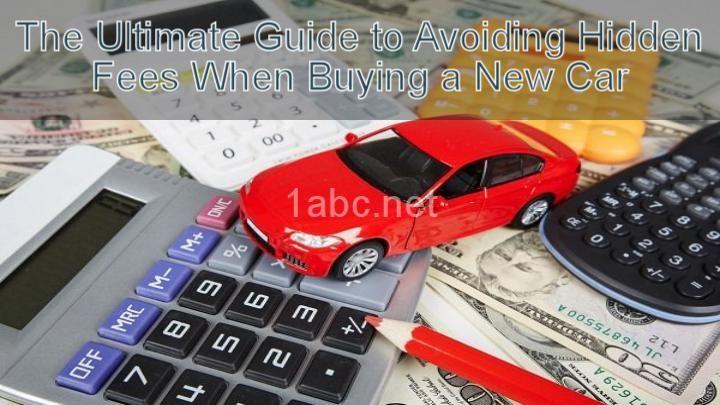The Truth Behind Hidden Fees: What Car Buyers Need to Know

Introduction:
Buying a car is an exciting process, full of anticipation and the promise of open roads. However, amidst the excitement, many car buyers often overlook an important aspect – hidden fees. These fees, though not always clearly disclosed by dealerships, can significantly impact the overall cost of purchasing a vehicle. In this blog post, we will delve into the world of hidden fees, their purpose, and how they can affect your finances. By becoming aware of these fees and equipping yourself with knowledge, you can make informed decisions and avoid unnecessary expenses.
Section 1: Understanding Hidden Fees
Before we delve into the specifics of hidden fees, it is crucial to understand what they are. Hidden fees are additional charges that are not explicitly disclosed by dealerships. They are often included in the final price of the car and can catch buyers off guard. These fees can vary depending on the dealership, location, and even the model of the car. Some common examples of hidden fees include documentation fees, destination charges, and advertising fees. The term "hidden" refers to the fact that these fees are not always clearly outlined or explained to buyers, thus requiring extra diligence on their part.
Section 2: Common Hidden Fees in Car Buying
Now that we have a clear understanding of what hidden fees are, let's explore some of the most common ones encountered during car purchases. One such fee is the dealer preparation fee. This fee covers the cost of preparing the vehicle for sale, including inspecting, cleaning, and ensuring it is in optimal condition. The average cost of this fee can range from $100 to $500, depending on the dealership and the extent of preparation required.
Another hidden fee that often catches buyers by surprise is the advertising fee. This fee covers the cost of promoting the dealership and its inventory. It can be as high as several hundred dollars and is typically non-negotiable. While advertising is a necessary expense for dealerships, it is important for buyers to be aware of this fee and factor it into their budget.
Additionally, destination charges are another common hidden fee. These charges include the cost of transporting the vehicle from the manufacturer to the dealership. The average destination charge for a car can range from $500 to $1,000, depending on the distance and method of transportation. It is crucial for buyers to be aware of this fee and ensure that it is reasonable and in line with industry standards.
Section 3: How to Identify and Negotiate Hidden Fees
Now that we know about common hidden fees, it's essential to understand how to identify them and negotiate, if possible. One way to identify potential hidden fees is by reviewing the invoice provided by the dealership. The invoice should provide a detailed breakdown of all charges, allowing buyers to spot any additional fees that were not previously discussed. If the invoice does not provide a breakdown, it is crucial to ask the dealership for one.
Another effective strategy for uncovering hidden fees is to ask for a detailed breakdown of the out-the-door price. This breakdown should include all fees, taxes, and any other charges associated with the purchase. By having a clear understanding of the total cost, buyers can identify any potential hidden fees and address them before finalizing the purchase.
When it comes to negotiating hidden fees, it is important to be proactive and assertive. Some fees, such as dealer preparation fees, may be negotiable. If you believe that a certain fee is unreasonable or unnecessary, don't hesitate to discuss it with the dealership. They may be willing to reduce or even waive the fee to secure the sale.
Section 4: Additional Considerations for Budgeting
Hidden fees can have a significant impact on your budget, so it is crucial to factor them into your financial planning. When creating a budget for a car purchase, it is essential to account for these additional costs. Researching the average costs of hidden fees can help you set a realistic budget and avoid any unpleasant surprises.
In addition to hidden fees, it is also important to consider other expenses associated with owning a car. These can include insurance, maintenance, and fuel costs. By factoring in all these expenses, you can create a more accurate budget that reflects the true cost of owning a car.
Conclusion:
In conclusion, understanding hidden fees is a vital aspect of the car-buying process. By being aware of the common hidden fees encountered during car purchases, such as dealer preparation fees, advertising fees, and destination charges, buyers can make more informed decisions and avoid unnecessary expenses. It is crucial to be proactive in identifying and negotiating hidden fees by reviewing invoices, asking for detailed breakdowns, and assertively discussing any fees that seem unreasonable. By incorporating hidden fees and other associated expenses into your budget, you can create a more accurate financial plan and ensure that your car purchase aligns with your financial goals. So, next time you embark on the car-buying journey, remember to keep an eye out for hidden fees and empower yourself to make financially wise decisions. Happy car hunting!
FREQUENTLY ASKED QUESTIONS
What are hidden fees when it comes to car buying?
When it comes to car buying, there are a few hidden fees that you should be aware of. These fees can add up quickly and affect your overall cost. Here are some common hidden fees to watch out for:
- Dealer Preparation Fee: This fee covers the cost of preparing the vehicle for sale, such as cleaning and inspecting. It is sometimes added to the sticker price and is often non-negotiable.
- Documentation Fee: Also known as the "doc fee," this fee covers the cost of processing the paperwork required for the sale. It can vary by dealership and can range from a few hundred dollars to over a thousand.
- Destination Fee: This fee covers the cost of delivering the vehicle to the dealership. It is typically charged by the manufacturer and is included in the sticker price. However, it's worth confirming this fee as some dealerships may attempt to add it on as an additional charge.
- Advertising Fee: Some dealerships may charge an advertising fee, which covers the cost of promoting their business. This fee is often non-negotiable and can range from a few hundred dollars to over a thousand.
- Title and Registration Fees: These fees vary by state and cover the cost of transferring the title and registering the vehicle in your name. They are typically paid to the state's Department of Motor Vehicles (DMV).
- Extended Warranty/Protection Plans: While these are not hidden fees per se, some dealerships may try to upsell you on extended warranties or protection plans. It's important to carefully consider whether these additional costs are worth it for your specific needs.
It's always a good idea to carefully review the purchase agreement and ask the dealership for clarification on any fees that you are unsure about. Additionally, researching and comparing prices from multiple dealerships can help you identify any hidden fees and negotiate a better deal on your car purchase.
Why do car dealerships charge hidden fees?
Car dealerships may charge hidden fees for several reasons, including:
- Profit Maximization: Hidden fees allow dealerships to increase their profits by adding extra charges on top of the vehicle's price.
- Pricing Tactics: Some dealerships advertise low upfront prices to attract customers but then add hidden fees to make up for the discounted price.
- Additional Services: Certain fees, such as documentation or processing fees, are often justified as coverings for administrative tasks and paperwork involved in car sales.
- Dealer Expenses: Dealerships may argue that certain fees, like delivery or destination charges, cover expenses related to transporting vehicles from manufacturers to their lot.
- Add-Ons and Extras: Some dealerships include optional extras, such as extended warranties or maintenance plans, and charge hidden fees for those services.
It's important to carefully review all the documentation and clarify any fees before purchasing a vehicle to avoid unexpected costs.
Are hidden fees included in the advertised price of a car?
Hidden fees are not typically included in the advertised price of a car. Advertisements for cars usually display the base price or the price before additional fees and charges are added. These additional fees, such as documentation fees, taxes, registration fees, and dealership fees, are often added to the final price of the car during the purchasing process. It's important to carefully read the fine print and ask the dealer about any potential additional fees before making a purchase to have a clear understanding of the total cost.
Are hidden fees the same for new and used cars?
Hidden fees can vary for new and used cars. While some hidden fees, such as sales tax, registration fees, and documentation fees, are common for both new and used cars, there are certain fees that may be specific to one category.
For new cars, additional fees may include destination charges, advertising fees, and dealer preparation fees. Destination charges cover the cost of shipping the vehicle from the manufacturer to the dealership, while advertising fees are incurred for promoting the vehicle. Dealer preparation fees are charges for tasks like inspecting and cleaning the car before delivery.
On the other hand, used cars may have fees like reconditioning fees, which cover any repairs or maintenance performed to get the car ready for resale. Additionally, a used car may have fees associated with obtaining a vehicle history report or conducting a pre-purchase inspection.
It's important for buyers to carefully review the documentation and ask the seller or dealership about any potential hidden fees to avoid surprises and make an informed decision.
Can hidden fees affect my financing or loan terms?
Yes, hidden fees can indeed affect your financing or loan terms. Hidden fees are additional charges that may not be disclosed upfront or may be buried within the terms and conditions of a loan or financing agreement. These fees can include application fees, processing fees, origination fees, prepayment penalties, and more.
Hidden fees can increase the overall cost of your loan or financing, impacting your monthly payments and the total amount you will repay. They can also affect the interest rate or terms of your loan, making it more expensive or less favorable.
It is important to carefully review all loan documents and ask questions to ensure you understand the full cost of borrowing. Take the time to compare offers from different lenders and consider the impact of any potential hidden fees before committing to a loan or financing agreement.




